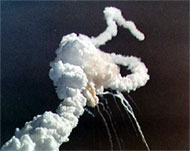Challenger disaster remembered
The widow of the commander of the space shuttle Challenger, which exploded after launch 20 years ago laid a wreath of roses and carnations at a memorial honouring the fallen astronauts, miles from the launch pad where the doomed shuttle blew apart.

June Scobee Rodgers, whose husband Dick Scobee had been the shuttle’s commander said “Our lives were shattered, but over the years all the families persevered”.
Seven US astronauts died in the explosion in 1986, and the video of the shuttle bursting apart was replayed over and over to a shocked nation.
On Saturday, 250 people joined a ceremony at Kennedy Space Centre to honour Scobee, pilot Mike Smith, astronauts Ellison Onizuka, Judy Resnik, Ron McNair and Greg Jarvis, and Christa McAuliffe, who was supposed to be the first teacher in space.
 |
|
Challenger exploded soon after |
Rodgers, along with Nasa associate administrator Bill Gerstenmaier, laid the wreath at the base of the Space Mirror Memorial, a tall granite-finished wall engraved with the names of the Challenger astronauts, the seven astronauts killed when space shuttle Columbia disintegrated over Texas in 2003 and the three Apollo 1 astronauts killed in a fire during a 1967 launch pad test.
Nasa’s failure
The investigation into the Challenger accident revealed a space agency more concerned with schedules and public relations than with safety and sound decision-making.
The explosion eventually was blamed on a poorly designed gasket in one of the shuttle’s solid fuel boosters which hardened in cold weather. The temperature at Challenger’s liftoff was 36 degrees (2 degrees Celsius).
|
“Without risk, there’s no discovery, there’s no new knowledge, there’s no bold adventure” June Scobee Rodgers, |
Engineers for a Nasa contractor had protested launching at that temperature, but they were overruled by their managers under perceived pressure from the space agency.
Mrs Rodgers said the Challenger accident hadn’t changed her opinion about the importance of space exploration: “It is our responsibility, individually and collectively, to make good decisions”.
“As engineers, the machines we build can do great things but can also cause great harm.” “Without risk, there’s no discovery, there’s no new knowledge, there’s no bold adventure,” Rodgers said.
“The greatest risk is to take no risk.”